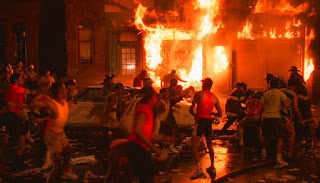Well, the first theme month has officially come and gone.
To that end, as we established last time, we're now moving into a look at black filmmakers in the Criterion Collection for Black History Month.
Before we get into this first entry, a small disclaimer – this was gonna be a lean month. I knew that going in one part because of our own selection, and also because, independent of what's on hand, Criterion has had something of a blind spot where POC filmmakers have been concerned. This has been brought up before, and last year they did respond saying more of an effort will be made to focus on this in the future, so we'll see what comes of it.
Just wanted to get that disclaimer out there up front was all, because this was enough of a discussion to get them to sound off was all.
So, with that said, let's start this theme with Spike Lee's classic Do the Right Thing.
In terms of what struck me about this, two things come to mind, both of which can be summed up as being about how well this movie has aged. This is, as some of you may be guessing, both a good thing and a bad thing.
First, the good – this was and still is, an incredibly well made film on several levels. Lee does a great job of setting up all of his players and their disparate plot lines throughout the day and slowly drawing them all together for the film's explosive finale. Further, Lee's script, as well as his cast, present a cross section of people with an impressive level of nuance. No one is presented as a complete saint or a two-dimensional villain, and as the heat rises on the day, no one manages to stay completely above the rising tension.
That nuance being a key part of what makes the tension in the movie work. Race is certainly not a new topic in film and not unique to this one movie, but this is a movie that gets a good handle on how to present it, with everyone presented as having both their humanizing moments as well as their biases and bigotries, presented in a fashion that doesn't feel forced.

Samuel L Jackson's Mr. Senor Love Daddy is probably the
closest to being above the growing tension and chaos,
and even that is largely a result of his job keeping him
separated from everything unfolding on the streets -
a voice trying to keep the peace to increasingly diminished effect.
I realize I'm painting in broad strokes. Admittedly, that's because every time I start to focus on a particular player or storyline, I feel like it will have to lead into going into at least four or five others as well. The movie's cohesive nature is both a blessing and a curse in that regard here, and has me honestly wanting to come back to this independent of this project and try to give it a more in depth going over.
...suffice it to say, I am wholeheartedly recommending this.
So what is the bad side of this?
As I said, this movie has aged incredibly well. Unfortunately, this isn't just a reflection on how the craft of the movie still holds up well over thirty years later. The other side of this is, thematically, much of this movie feels uncomfortably all too familiar.
early on feels a bit dated now. That said, not exactly scoring
a point for things in the 2020s by acknowledging that.
I'm gonna say now, if you haven't seen this, this is probably the best time to step out (or go to the bottom of the page for the next installment teaser image) cause to really go into this, I will need to drop a spoiler.
Okay? All clear?
Good. Moving on.
On this rewatch, there was already that sense of familiarity in how some of the racial tensions were still there. That wasn't too shocking on its own. The part that really hit home with this regard was in the movie's finale, most notably the death of Bill Nunn's character, Radio Raheem, put into a lethal choke hold by the police.
Raheem's death in the film isn't meant to be read as simply a fictional hypothetical by Lee. In fact, even within the confines of the film, parallels to what happens to Raheem are drawn by other characters using real life examples of other black people killed as a result of police brutality.
This was before Rodney King. Before Tamir Rice. Before Eric Garner. Before George Floyd. Before Breonna Taylor. Those are just off the top of my head. Again, if I tried to comprehensively list every incident since this movie's release, we'd be here a while. The fact that that is only scratching the surface says a lot right there.
Watching and remembering discussing this in film school,
wherein the professor pointed out how some audiences at the time
completely missed the point of this ending and questioned the property
damage.
...Yeah, watching this in 2021 is a LOT.
It's a grim feeling, and one that honestly calls to mind the ending of Lee's later film BlackKklansman – as much as it may be comforting in other films to act as though this sort of thing is in the past and over with, it hasn't gone away. If anything, it's gotten worse with time, to the point where reminding one's self this movie was made in '89 does little to dispel how contemporary much of what one sees in this feels.
...Okay. Those of you who walked out for spoilers, it's okay to come back in. Once again, standing by the recommendation on this one.
Hopefully if you've not seen this one, that will change soon.
In the meantime, back next week with the next entry for this month's theme.




No comments:
Post a Comment